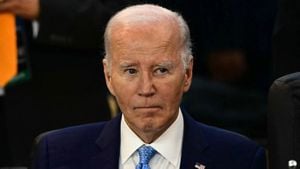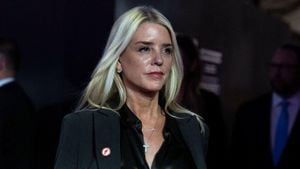Former Representative Matt Gaetz of Florida, once viewed as a rising star within the Republican Party, officially withdrew his name from consideration for the position of Attorney General under President-elect Donald Trump on Thursday. His withdrawal follows allegations of serious, unlawful conduct, including claims of sexual misconduct involving minors.
The announcement came as no surprise to many observers, as Gaetz has faced rumors and scrutiny surrounding his conduct for over two years. Reports indicated he struggled to secure necessary votes for confirmation, with key figures within the Republican Party expressing hesitance to support his nomination due to the allegations.
Gaetz had cleared about eight days between Trump announcing his nomination and officially pulling out. Yet, what the former Florida congressman called “critical work” of the administration was overshadowed by concerns swirling around his character and past actions. He announced his decision via the social platform X, noting it was time to avoid becoming “a distraction” as the Trump administration prepared for its transition.
Before making the public announcement, Gaetz reportedly spoke with Trump, who conveyed insights about the dwindling chances of confirmation. The discussion revealed deep concerns within the GOP, where Gaetz had come to be seen as politically toxic due to the baggage he carried from the allegations against him.
With Trump holding only a narrow 53-47 majority in the Senate, he would have needed to secure nearly every Republican vote to move forward with Gaetz's appointment. Early on, Senators like Lisa Murkowski and Susan Collins signaled their skepticism about backing Gaetz, prompting worries within the Trump team. Once it became evident Gaetz would lack sufficient support, he opted to step aside.
Trump’s view was somewhat mixed. He shared on Truth Social his appreciation for Gaetz, calling his efforts commendable, but also mentioning, “did not want to be a distraction for the Administration.” Yet sources familiar with the situation indicated this was likely more than just public courtesy; it reflected behind-the-scenes acknowledgment of the undeniable troubles Gaetz faced.
From Gaetz’s perspective, his withdrawal was framed as necessary to protect the administration's focus on its priorities. He stated, “There is no time to waste on a needlessly protracted Washington scuffle,” emphasizing his commitment to the transition process, which he claimed should start on solid footing without complications.
Nevertheless, Gaetz’s history may be hard to shake off entirely. While he managed to dodge major charges previously investigated by the Department of Justice, multiple allegations have surfaced, including accusations of sexual encounters with minors. NBC News reported on the investigations by the House Ethics Committee, which highlighted another encounter involving women and minors, adding more strain to his political career.
Even before Trump’s official nomination, much of the political atmosphere around Gaetz was already set against him. Prior to receiving the Trump nomination, two women had come forward asserting they were paid by Gaetz for sex, and it was revealed during the Ethics Committee hearings how these women detailed their allegations, including witnessing Gaetz with a minor.
The specter of these allegations dogged Gaetz not just as he sought to ascend to the position of Attorney General but also throughout his political career. His insistence on denying wrongdoing did little to allay concerns among GOP senators, many of whom had expressed reluctance to move forward with confirming him amid the swirling accusations.
Alongside the mounting worries among senators, there was also considerable olution within the Justice Department at the news of Gaetz's withdrawal. Officials suggested the cloud of uncertainty surrounding his candidacy was already causing concern. One official remarked, “Certain events, like the sun chasing away the dark of night, are not surprising, they’re expected.” This statement, delivered with intertwined relief and caution, highlighted the Gov philosophy many carried indicating the need for the department to stabilize under new leadership.
Despite Gaetz’s high-profile bids for cabinet positions, it became apparent his past would continue to overshadow his political ambitions. His allegations, investigations, and the growing credibility of the claims lodged against him bleed heavily on concerns for anyone considering supporting him politically.
Trump, as expected, did not delay much before seeking to replace Gaetz as his nominee for Attorney General. Shortly after Gaetz’s exit, Trump announced his intention to nominate Pam Bondi, a former Florida Attorney General and loyal Trump ally, for the position instead. Bondi’s nomination was quietly welcomed by many Republicans who had been reluctant to support Gaetz’s application.
Following Trump’s announcement, Representative Mike Lawler of New York took to social media, asserting, “Justice has been served,” with reference to the developments surrounding Gaetz’s withdrawal. The exchange merged tension and politics seamlessly, showcasing how remove risk from the public lead and adequately distance the GOP from Gaetz's controversies.
This latest chapter, embodying both Gaetz's retreat and Trump’s quick pivot to Bondi, reveals the delicate nature of political loyalty and survival within the GOP's complex atmosphere, especially as it stands to navigate the waters of Trump’s imminent administration.
While moving away from Gaetz, the fresh appointment symbolizes both Trump’s adaptability and the GOP’s attempts to reshape their public image, signaling they would not entertain scandalous figures at the helm of important positions, especially with the country’s focus shifting rapidly toward looming elections.
Bondi, now set under the spotlight, must prepare to tackle the challenges and dynamics of leading the Department of Justice, all the time without the shackles previous candidates dealt with. It remains to be seen how she will adapt and what it means for the future structure of the cabinet as Trump lays his plans for the transition period ahead.



